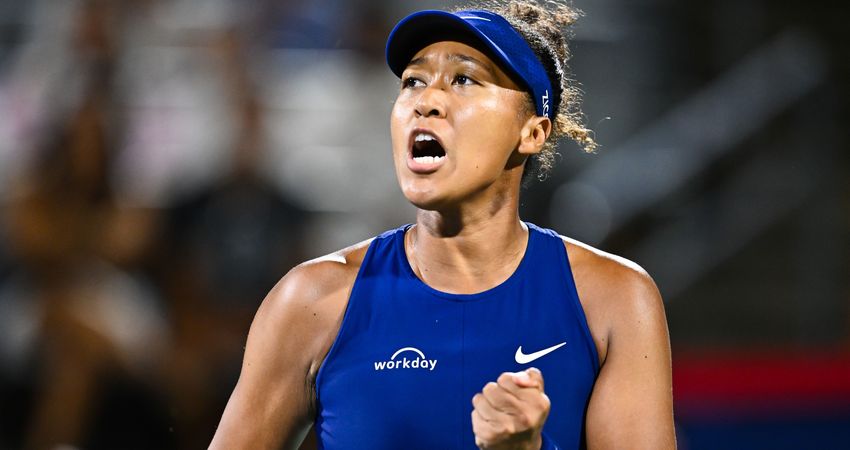Osaka or Mboko? Who has the edge in the Montreal final?

Most of the statistics -- not to mention any kind of rational thinking -- favored No. 3 seed Elena Rybakina against an 18-year-old in her first-career WTA Tour semifinal. The former Wimbledon champion had won their first meeting two weeks ago in Washington D.C., and most of her matches against teenagers and wild cards in the course of her career.
But backed by a rabidly partisan crowd at the Omnium Banque Nationale in Montreal, Canadian Victoria Mboko improbably won her sixth match of the tournament to advance to Thursday’s 6 p.m. ET final against four-time Grand Slam champion Naomi Osaka.
Not surprisingly, the two unseeded players have never met.
Overcoming what looked like a potentially nasty wrist injury, Mboko prevailed over Rybakina 1-6, 7-5, 7-6 (4) in a match that lasted 2 hours and 46 minutes. Not only did she save a match point in the process, but she has now beaten three former Grand Slam champions, including No. 1 seed Coco Gauff.
And now there is the possibility of a fourth in Osaka.
Montreal: Draws | Scores | Order of play
“Tres difficile,” Mboko said in her on-court interview in French of the final step.
And immediately added in English, “Anything can happen.”
Mboko spoke with authority -- because in a remarkable dozen days, it already has.
We make the case for each of the finalists:
Advantage, Mboko
She’s utterly fearless.
While it’s nice to have the crowd behind you, it can also add to the pressure. Time and again against Rybakina, Mboko dug out of deep holes. After getting blasted in the first set, she ran out to a 5-3 lead in the second, but lost the next two games -- before winning the last two and executing a credible two-handed Rafaesque fist pump.
Mboko weathered 11 double faults (Rybakina had one), including one in that deciding tiebreak. At 4-all she smoked a forehand winner down the line, then watched as Rybakina missed a backhand wide and yet another forehand long.
Mboko landed 73 percent of her first serves, far better than Rybakina’s 55 percent.
“She served really well in these important moments,” Rybakina said afterward.
You won’t want to miss this one 🤭
— wta (@WTA) August 7, 2025
Who will claim the victory tomorrow?@CorpayFX | #OBN25 pic.twitter.com/KYfJzXHWvx
Wild cards are mostly an attempt by the home tournament to take care of its own and, true to form, seven of eight at the Canadian Open went to Canadians. Three of them lost first-round matches and three fell in the second round. Mboko is 6-0 and only the third wild card to reach the final here. The others were named Seles (1995) and Halep (2015).
Mboko, who had tremendous success earlier this year in ITF events, has now compiled a 52-9 across all levels. At this point, it’s clear she expects to win. Why should the final be any different?
“Since the beginning of the year, she win so many matches,” her coach Nathalie Tauziat said. “So it give you a lot of confidence. It’s not because you are one break down that you have to be in panic.”
Let the record show that Mboko has now progressed one round further than Tauziat in Canada; she lost in the 1990 semifinals to Steffi Graf.
After losing her first four career meetings against Top 20 opponents, Mboko’s now beaten two of them -- Top 10 seeds Gauff and Rybakina.
History says she has a fighting chance. Mboko (18 years 336 days) is the fourth youngest finalist at the Canadian Open since 2000, older only than Belinda Bencic (2015), Ana Ivanovic (2006) and Serena Williams (2000).
The first two won the title.
Advantage, Osaka
It’s happening.
For the better part of two seasons after returning from childbirth, Osaka has grown increasingly frustrated with her inability to find the championship form that brought her four Grand Slam titles.
Coming into Montreal, her comeback record was 37-28. Fine by most standards -- but Osaka isn’t most players.
The wait seems to be over.
With a 6-2, 7-6 (7) win over No. 16 seed Clara Tauson in Wednesday night’s semifinal, Osaka looked a lot like her vintage self.
She has now won six consecutive matches for the first time since reaching the 2022 Miami Open final. It’s ironic -- or is it merely a coincidence -- that she lost that match to Iga Swiatek whose then-coach Tomasz Wiktorowski is now employed by Osaka.
Naomi didn’t come to play 😤@naomiosaka puts on a clinical showing to secure her spot in the Montreal final, defeating Tauson 6-2, 7-6(7)!#OBN25 pic.twitter.com/GMIq5FRjub
— wta (@WTA) August 7, 2025
This is only Osaka’s second final in the three years since. The first came in Auckland when she retired with an abdominal injury -- after losing the first set to Tauson.
This time, she finished the job and looked good doing it. Osaka has a bounce in her step and is moving better than she was earlier this year. Against Tauson, there were a number of her signature acutely angled winners. Where there was once passivity there is now passion -- and more than a few “Come ons!”
Osaka served well against Tauson, winning 31 of 41 first-serve points and, more importantly, 20 of 37 second serves. She saved seven of nine break points and converted four of five.
Just a reminder: Only Venus Williams (seven) and Swiatek (six) have more major titles among active players. Osaka seems to be rounding into major form.







